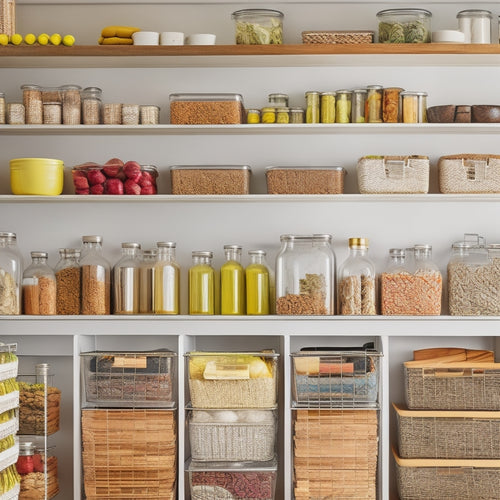
Engage With Interactive Cooking and Life Skills
Share
Mastering interactive cooking and life skills is a powerful way to cultivate independence, self-confidence, and a healthier lifestyle. By combining essential cooking techniques with practical life skills, individuals can take control of their daily routines and make informed decisions. Interactive learning resources, such as hands-on activities and digital tools, make acquiring these skills enjoyable and effective. With a strong foundation in cooking and life skills, individuals can navigate challenges and reach their potential. As you explore the world of interactive cooking and life skills, discover how to discover new possibilities and transform your daily life.
Key Takeaways
• Interactive cooking skills promote independence, self-care, and nutrition in daily life by mastering meal planning and grocery shopping.
• Building a strong foundation in cooking techniques, such as roasting and sautéing, ensures precision and accuracy in recipes.
• Engaging with interactive resources, like digital tools and special education activities, makes learning cooking and life skills enjoyable and effective.
• Developing essential life skills, including cooking, fosters autonomy, self-confidence, and the ability to manage routines and make informed decisions.
• Leveraging hands-on resources and activities, such as interactive recipes and healthy vs. unhealthy foods drag and drop, enhances learning experiences and builds practical skills.
Cooking Essentials Made Easy
By mastering fundamental cooking skills and knowledge, individuals can confidently prepare healthy meals and develop a lifelong appreciation for cooking. Cooking Essentials Made Easy focuses on building a strong foundation in cooking techniques, ensuring that individuals can execute recipes with precision and accuracy.
This includes understanding various cooking methods, such as roasting, grilling, and sautéing, as well as properly using kitchen tools and utensils. Additionally, kitchen safety is emphasized, teaching individuals how to prevent common hazards, such as burns and foodborne illnesses, by maintaining a clean and organized workspace.
Life Skills for Independence
Acquiring essential life skills, including interactive cooking and food safety knowledge, empowers individuals to achieve independence in their daily lives.
Mastering cooking basics and essential skills, such as meal planning and grocery shopping, enables individuals to take care of themselves and their nutrition.
Independence activities, such as cooking and food preparation, foster a sense of autonomy and self-confidence.
By developing life skills, individuals can manage their daily routines, make informed decisions, and navigate everyday challenges. This, in turn, promotes a sense of independence, allowing individuals to thrive and reach their full potential.
Fun Learning Resources Ahead
As individuals start on their journey towards independence, they can leverage a wide range of engaging and interactive resources to make learning cooking and life skills a fun and enjoyable experience.
Interactive recipes and engaging activities can help build practical skills and confidence in the kitchen.
Hands-on learning resources, such as measuring cups digital interactive activities and food storage digital activities, provide an interactive way to learn essential skills.
Additionally, special education interactive activities, like healthy vs. unhealthy foods drag and drop, can cater to diverse learning needs.
Frequently Asked Questions
How Do I Modify Recipes for Special Dietary Needs?
When modifying recipes for special dietary needs, consider ingredient substitutions and dietary restrictions, such as gluten-free flours or dairy-free milk alternatives, and incorporate allergy-friendly cooking tips to guarantee safe and enjoyable meals for all.
Can Interactive Cooking Activities Be Adapted for Different Ages?
When adapting interactive cooking activities for different ages, consider age-appropriate adaptations, such as simplified recipes for younger learners or complex techniques for older students, to facilitate multi-age engagement opportunities that cater to diverse skill levels.
What Are Some Ways to Make Cooking More Accessible for People With Disabilities?
To make cooking more accessible for people with disabilities, incorporate adaptive cooking techniques, such as one-handed cooking methods and assistive kitchen tools, like adapted utensils and accessible kitchen tools, to promote independence and confidence in the kitchen.
How Do I Teach Food Safety Habits to Individuals With Special Needs?
According to the Centers for Disease Control and Prevention, one in six Americans gets sick from foodborne illnesses each year. To teach food safety habits to individuals with special needs, utilize visual aids and sensory learning, followed by hands-on practice and modeling techniques to reinforce proper hygiene and handling practices.
Are There Any Interactive Cooking Activities Suitable for Non-Verbal Individuals?
When teaching non-verbal individuals, consider incorporating adaptive tools and sensory experiences into interactive cooking activities, such as tactile measuring cups or exploring textures, to foster engagement and understanding of cooking concepts.
Related Posts
-

Tiered Racks for Kitchen Pantry Organization
Tiered racks can enhance your kitchen pantry by maximizing vertical storage and increasing visibility. They help you ...
-

Creative Organization Ideas for Tight Kitchen Spaces
To create an organized kitchen in tight spaces, think upwards. Install shelves that reach the ceiling and use wall-mo...
-

Corner Cabinet Storage for Dinnerware Sets
Corner cabinet storage for dinnerware sets can change your kitchen into an organized, stylish space. By utilizing ver...


